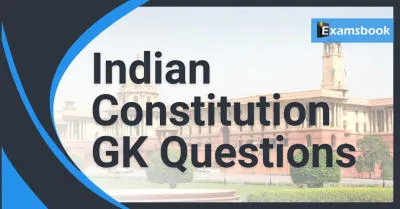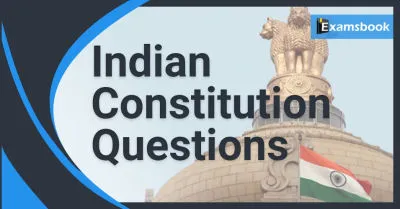- Free Test Series, Mock tests and Practice Tests
- Time proven exam strategies
- Exam analysis and simulated tests
- Hand-on real time test experience

Recently Added Articles View More >>
Welcome to our blog on Indian Economy General Knowledge (GK) questions tailored for SSC Exams! This comprehensive guide is designed to equip aspirants with crucial insights into the Indian economy, encompassing topics such as economic policies, growth indicators, budgetary allocations, and key economic reforms.
Welcome to the Common GK Questions for SSC Exams blog, your ultimate resource for mastering General Knowledge (GK) to excel in Staff Selection Commission (SSC) exams.
Welcome to our comprehensive blog dedicated to History Quiz Questions for Competitive Exams! Whether preparing for civil services, entrance tests, or any other competitive exams, mastering history is crucial for success
Welcome to our Economics GK Quiz for Competitive Exams blog! Whether you're preparing for government job tests, banking exams, or any other competitive assessments, our Economics GK Quiz blog is your go-to resource for mastering economics general knowledge.
The "Common GK Quiz and Answers for Competitive Exams" blog is a valuable resource designed to aid aspirants in preparing for various competitive exams. It offers a comprehensive collection of general knowledge quizzes and answers, covering a wide range of topics from history and geography to science and current affairs.
Welcome to our Indian Economics GK Quiz with Answers blog, where we unravel the complexities of India's economic landscape through engaging quizzes! Test your knowledge on topics ranging from macroeconomics to fiscal policies, and learn fascinating facts about India's growth trajectory, monetary systems, and global trade dynamics.
Welcome to our Common General Knowledge (GK) Quiz, tailored specifically for SSC (Staff Selection Commission) exams! Whether you're preparing for SSC CGL, CHSL, MTS, or any other SSC exam, this quiz is designed to test and enhance your knowledge across various topics.
Welcome to our Indian Economics GK Quiz, tailored for competitive exam aspirants! Dive into a world of economic principles, policies, and key figures that shape India's financial landscape. Test your knowledge and sharpen your understanding of topics ranging from fiscal policies to market dynamics.
Most Popular Articles
Most Popular Articles
Recently Added Questions
- 1Australiafalse
- 2Central Asiafalse
- 3South-East Asiatrue
- 4Eastern Europefalse
- Show AnswerHide Answer
- Workspace
- SingleChoice
Answer : 3 South-East Asia
Explanation :
According to Avinash Chandra Das and Dr. Sampurnanand, the Arya Sapta came from the Saindhava region i.e. the north-western part of India. It has been called the Adidesh of the Aryans. Pandit Ganganath Jha told that Arya Brahmarshi had come from the country i.e. Burma, Thailand and Myanmar.
Who has become the first woman sniper of the Border Security Force (BSF)?
1.4K 0 65e9aa3ca731c7722ac93b1e- 1Shaliza Dhamifalse
- 2Shiva Chauhanfalse
- 3Deepika Mishrafalse
- 4Suman Kumaritrue
- Show AnswerHide Answer
- Workspace
- SingleChoice
Answer : 4 Suman Kumari
Explanation :
Border Security Force (BSF) sub-inspector Suman Kumari has become the first woman sniper of the Border Security Force. Suman recently completed an eight-week sniper course at the Central School of Weapons and Tactics (CSWT), Indore and achieved 'Instructor Grade'. Suman is a resident of Mandi district of Himachal Pradesh. She joined BSF in the year 2021.
In which country is the multinational military exercise 'Peace Prayas IV' being organised?
1.5K 0 65d875e319457b4231b67221- 1Indiafalse
- 2Nepaltrue
- 3Bangladeshfalse
- 4Pakistanfalse
- Show AnswerHide Answer
- Workspace
- SingleChoice
Answer : 2 Nepal
Explanation :
Multinational military exercise 'Shanti Prayas IV' is being organized in Nepal. 19 countries including India, Bangladesh and Pakistan are participating in this exercise. Prime Minister Pushpa Kamal Dahal "Prachanda" inaugurated this two-week long military exercise.
Green Rooms, which were in the news recently, are related to which country?
1.9K 0 65ae125ced7feac87d6d36fd- 1Japanfalse
- 2Americafalse
- 3Ukrainetrue
- 4Southern Africafalse
- Show AnswerHide Answer
- Workspace
- SingleChoice
Answer : 3 Ukraine
Explanation :
The United Nations Development Program (UNDP) and the Government of Denmark recently launched a “Green Room” in Ukraine. “Green rooms” are specially equipped spaces that facilitate interaction between police officers and child victims and witnesses of crime. The goal is to build trust in law enforcement among children and youth.
Approximately what percentage of the world's trade passes through the Suez Canal which has been disrupted due to the recent attacks in the Red Sea?
2.8K 1 658d5a737274ac7b58bf86e5- 112%true
- 213%false
- 316%false
- 419%false
- Show AnswerHide Answer
- Workspace
- SingleChoice
Answer : 1 12%
Explanation :
12% of world trade passes through the Suez Canal, which handles the shipping route between Asia and Europe. The canal has faced disruption following recent attacks by Yemen's Iran-aligned Houthi group on ships in the Red Sea. This has blocked trade and prompted the establishment of a naval task force for safe passage. The hostilities affect the movement of global goods, causing supply chain backups and shortages. The attacks are part of the ongoing conflict in Yemen between the Houthis and the Saudi-led coalition. The location of the Suez Canal makes disruptions strategically important.














